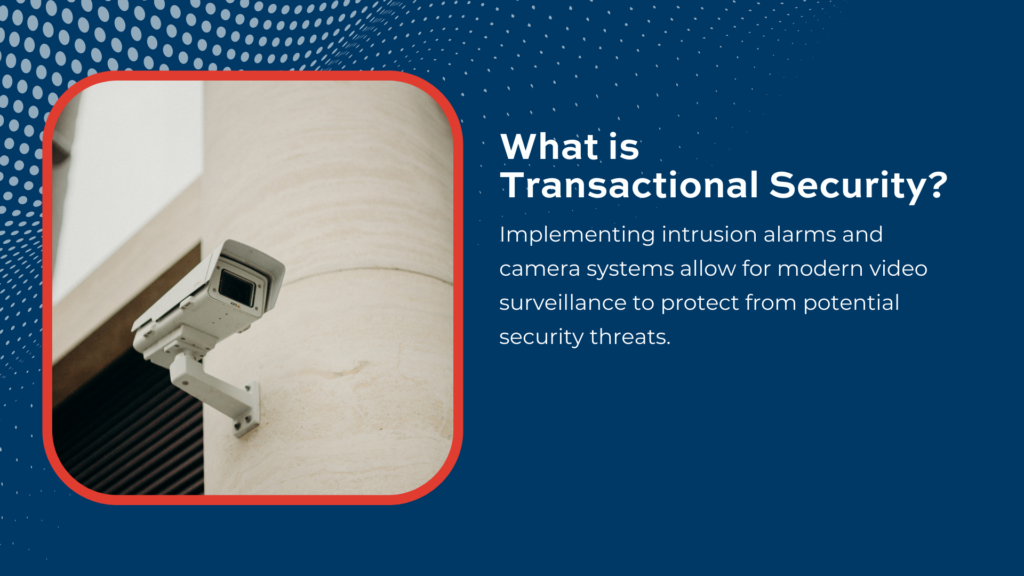Transactional security provides an extra layer of protection against risk for financial institutions and their customers. In 2022, transactional security has become more sophisticated than ever, with both physical and electronic security solutions, and at Wittenbach, we are committed to educating and empowering your financial institution with best-in-class, first-in-line solutions. Not only will we explain what transactional security is and how it works, we will also delve into examples of our offerings to illustrate what is possible when keeping your branch safe.
What is Transactional Security?
Transactional Security refers to the safe, professional handling of confidential information or goods during a given business transaction (credit card payments, cashing paychecks, etc.). Any banking services which play a significant role in the functioning of a banking institution are known as Transactional Banking, or Transaction Banking. For such services, Transactional Security enables the safe distribution of money, cash management services, and other operational needs for day-to-day banking transactions.
Who Typically Handles Transactional Security?
A bank’s Transactional Banking Division is usually responsible, in both corporate and financial institutes, for providing these services and commercial banking products. Its functions include cross-border and/or domestic payments, international trade finances and trusts, risk management, depositary, and other related services. The Transactional Banking Division of a bank is composed of Trade Finance, Trust & Securities Services, and Cash Management businesses.
What are Some Successful Examples of Transactional Security?
One successful approach to keeping branches safe and secure is through electronic security systems. For example, implementing intrusion alarms and camera systems allow for modern video surveillance to protect from potential security threats.
Another innovative way transactional security has evolved is through video integrating to deposit and withdrawal transactions. These transactions can run either at the teller line or at an ATM with cameras connected to the branch NVR network. Then, an open but secure API on the video analytics allows for transactions to be searched by account number, cash amounts, and times of day to track each transaction.
In addition, Teller Cash Recyclers (TCRs) are a viable resource for modernized banking. This technology is capable of authenticating bank notes and securely storing cash within a vault. TCRs are also capable of automating cash transactions for the tellers such as cash inventory, deposits, and withdrawals.
Another form of Transactional Security which has stood the tests of time is physical security. Be it vaults, safes, lockers and/or pneumatic tube systems, these products will always play an major role in offering security for any valuable stored items.
Benefits to Implementing Transactional Security Measures and Current Trends
Implementing Transactional Security measures is crucial for a successful and safe banking environment. Through physical and electronic security measures, you can empower your team, provide safe transactions for your customers, and protect your company’s assets. For instance, automated cash handling solutions such as the TCR, can allow tellers to count quicker, serve faster, and reduce handling error through cash automation. State-of-the-art vaults and camera systems also allow you to remain in control of your branches 24/7 and greatly decrease the chances of any security breach by intimidating and deterring potential theft.
Within the transactional banking sector, there are a multitude of global trends which are shedding a new light on this growing space. These trends include the recent increase of importance concerning liquidity management, the globalization of trade, and a heightened emphasis on securing relationships between both clients and competitors. The relatively low regulatory capital requirements of transactional banking have also made it a particularly attractive area for growth and new innovations.

Transactional Security Services with Wittenbach
Here at Wittenbach, we recognize the importance of Transactional Security and ensure that we provide state-of-the-art physical & electronic security for our clients. Whether it be intrusion alarms and surveillance systems, vaults, or NVRs, our expertly trained technicians and account managers create and service systems to keep your consumer’s information confidential, deter theft, and allow you to maintain control over your assets.
Physical security systems provided by Wittenbach include:
- Vaults (Panels and Doors)
- Access Control Systems
- Safes
- Lockers
- Safe Deposit Boxes
- Undercounter Systems
- Drive Up Systems
- Bullet Resistant Glass
- Deal Drawers
- Point to Point Systems
Electronic security systems provided by Wittenbach include:
- Intrusion Alarms
- Access Control
- NVRs
- IP Cameras
Wittenbach services a wide range of markets including financial institutions, commercial buildings, academic institutions (Schools/College/Campus), hospitals, and retail. To learn more about how Wittenbach can provide Transactional Security to you and your customers, schedule an in-person or virtual tour today to explore which of our physical and/or electronic security solutions are right for you.




